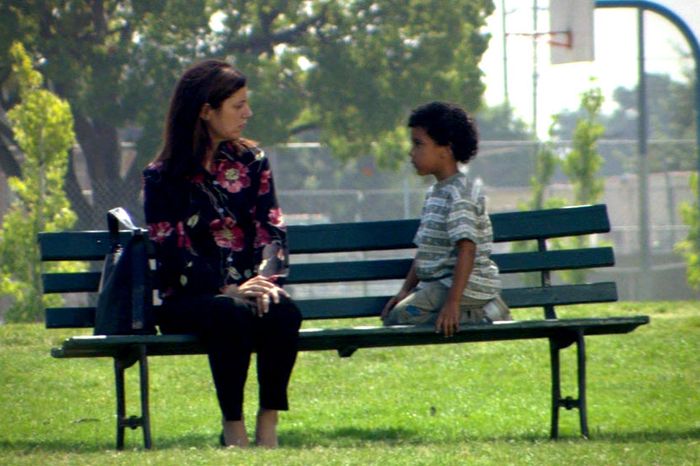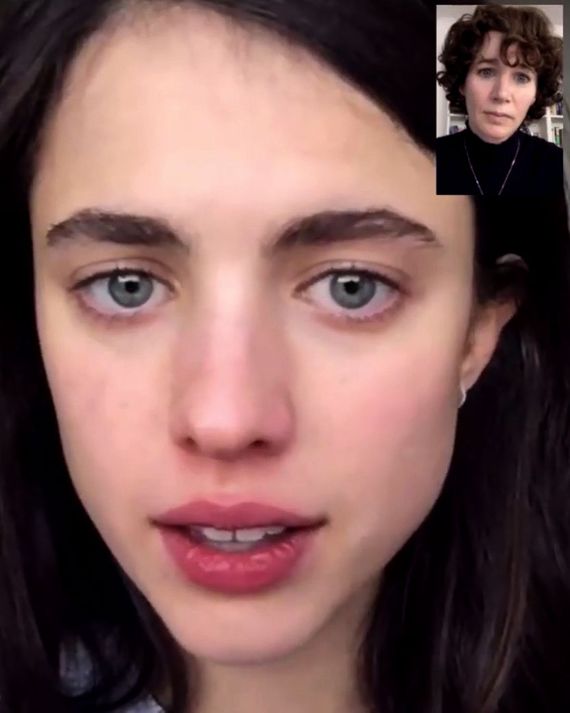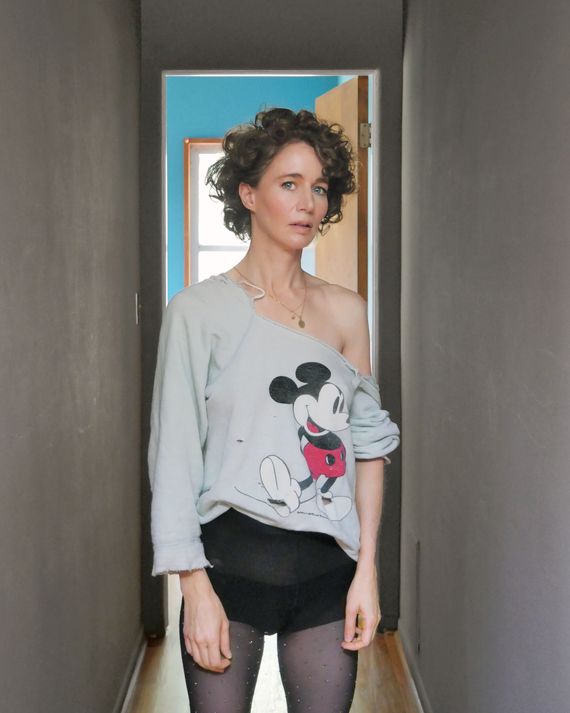
Every Wednesday, Miranda July goes to her old home, a modest two-bedroom in Echo Park she has kept for over 15 years, and stays the night. Initially, she felt more anxious about the arrangement than did her husband, the filmmaker Mike Mills, and their 8-year-old, Hopper. Are mothers allowed to do this? But she needed a room of her own. Psychic space just a seven-minute drive away! In this house, there is no cooking. Usually, she’s obsessive-compulsive clean, but she lets that stuff go. Takeout is king. Dirty dishes? Into the fridge. Beds? Unmade. She can be an artist first and not a mom or wife or domestic sex goddess. She puts her phone inside an airtight container with a timer that beeps like a bomb and locks up the internet with Freedom for Mac. When she wakes up Thursday morning, she writes down what she dreamt the night before and then gets to work. Welcome to Planet Miranda July. Population: one, or maybe 5 million, depending on how you count souls.
“It’s a grant that’s made my life possible,” July says as she gestures toward the long, sunny table where we have been talking over the past several months. “The fact that this rent has only gone up $30 a year is amazing.” Originally, 2020 was supposed to be her “401(k) year.” Criterion released an edition of her first feature, Me and You and Everyone We Know, along with an assortment of her early works; she published a career-spanning monograph; her third film, Kajillionaire, was set to premiere. She would say yes to publicity! She would say yes to making money! “You’d have to be very established to not worry as you got older about what was going to happen to you financially as an artist,” she says, “especially as a woman artist.”
Money has long fascinated her as a concept, but it wasn’t ever the goal. Even at this moment, she has only $2,000 in her bank account until the next installment of her book advance. But please don’t misunderstand: This is her choice. She could be doctoring scripts or doing brand collaborations, but what she values most is creative freedom, which the pursuit of wealth can muck up. It’s a carryover from her DIY, riot-grrrl-adjacent days in Portland in her early 20s. Money bought time to do art. She waited tables; she worked at Pop-A-Lock. She shoplifted little things and scammed copy centers. (Sorry, Kinko’s!) She stripped and then worked at a peep show. She hated it, so she thought about efficiency. She put an ad out in the Willamette Week with the headline “SPOIL ME” and found a client, an architect, whom she had sex with a handful of times while her friend sat in a car nearby. It got her enough money to buy something big — she can’t remember, maybe a laptop. “I was able to get out of the hole I was in and not look back,” she says.
The house in Echo Park has been the container for much of her career. When she first moved in, it doubled as the production office for Me and You. She is prolific and elastic when it comes to medium: Her second movie, The Future, came sandwiched between a book of short stories (No One Belongs Here More Than You) and her first novel (The First Bad Man). There was a series of sculptural works at the 2009 Venice Biennale, an audio piece for the Whitney, a messaging app called Somebody, a narrative Instagram piece with Margaret Qualley. Sometimes her projects made money; often they didn’t.
At its core, much of July’s work is a search for human connection in all its weird, sticky intimacies. Kajillionaire looks closely at an emotionally stunted family. Theresa (Debra Winger) and Robert (Richard Jenkins), con artists and parents to Old Dolio (Evan Rachel Wood), treat their daughter more like a peer than a child. The story was unexpected, even for July. She first saw the characters as she was waking up, faint like faraway fireflies. She caught the image and whispered it into a voice memo, which she simply titled “Family Movie.” “I was like, Ugh,” she says. “Just the saddest feeling. This is family stuff I would never willingly go toward.”
The entire experience of making it was a thrill. For the first time, July felt she had everything she needed to make a movie: people who gave her their full support and enough money to enact her vision. Because, for once, she wasn’t starring in her own film, she could pour her energies into directing. But after production, the release stalled. The studio, Annapurna, was facing bankruptcy, which meant she had to find another distributor at Sundance. (Focus Features came onboard.) The movie fell into limbo, and so did July’s spirits. “I was very, very depressed last year,” she says. Normally, she and Mills have a system: One of them does a movie, and then they get to take it out into the world. There’s something about the appearance of a heterosexual family unit — even though July is queer and their child is nonbinary — that requires pushback; otherwise one can slide into woman clean, man work. They keep their bank accounts separate, with a joint one for Hopper. “It’s like church and state between our work and private life,” says Mills. “Neither of us ever has any idea how much money the other has,” July adds.
When quarantine restrictions began, suddenly home was all there was. Child care. Beans. Stock. It became harder to do her Wednesday overnights, but it was just as necessary to keep doing them. “For women who’ve worked hard to not feel bad about prioritizing work over a certain domesticity, it’s a little thornier — the freedom from all that was hard-won,” she says, “and a mind-fuck to begin with.”
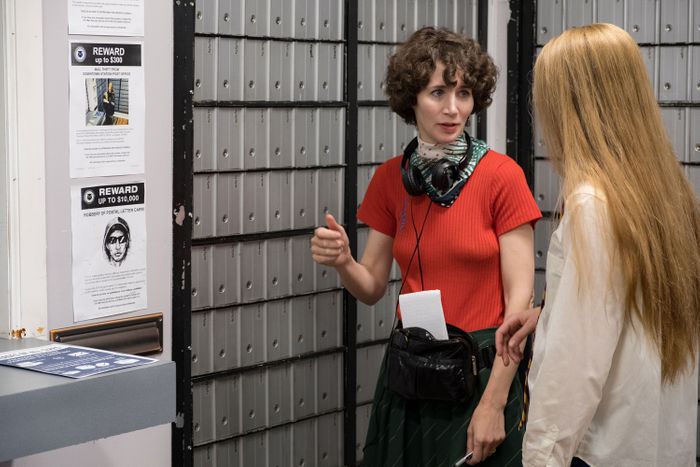
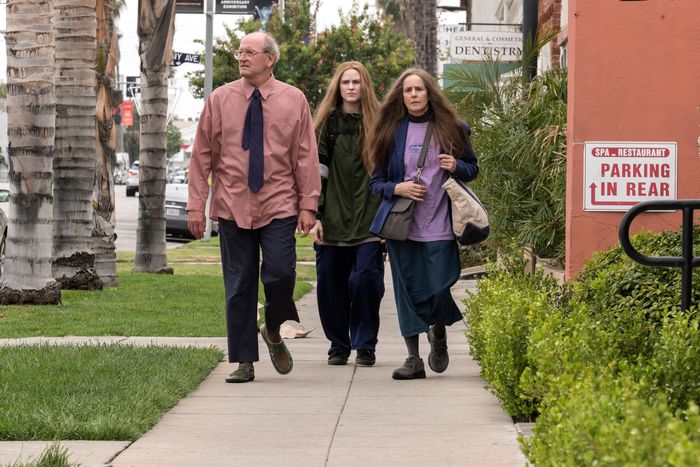
Miranda July grew up in a house of books. Her parents, Richard Grossinger and Lindy Hough, both writers, started a publishing company called North Atlantic Books, which they ran out of their house in Berkeley for many of her formative years. The aggressively normal name belied its specialty in a kind of woo-woo hippie avant-gardism of the ’70s (some of which has gone mainstream today), with books on Eastern religions, homeopathy, and alternative healing practices, along with others that veered into spiritual arcana. Her mother published poetry and occasionally took on other jobs for money. Her father is an outsize presence in the family dynamic. He taught anthropology and has published a number of books, including some on embryogenesis, an autobiographical trilogy, and, recently, a three-book series called Dark Pool of Light: Reality and Consciousness.
“I grew up in a very anxious family, where things could spin into a sense of crisis easily, and that’s how I’m calibrated,” July says. “My dad will fall down the rabbit hole of crisis and make it have a larger meaning cosmologically. There is just incredible haunting, debilitating anxiety and trauma in that person.” Her undiagnosed chronic eye problem, for instance, might be a manifestation of inherited trauma. “I’ve taken in some of that as my worldview too,” she says, “but also, Wait, this is real. It’s not inherited psychic pain from your mother’s suicide. Also there’s just so much pus.”
Her relationship with her older brother, Robin, was grounding. He was a talented woodworker at a young age, carving knickknacks and furniture with hidden compartments. He built a large dollhouse for her, and they would work on it together, sometimes re-creating what they’d seen elsewhere, like a friend’s real-life playroom that had carpeting that looked like interlocking puzzle pieces of different fabrics; they did the same in miniature with carpet samples. As Robin’s skills grew, so did his ambition, and eventually he built a playhouse in the backyard that grew to two stories. It had a wooden refrigerator and a sink made from a bottle with a spigot. “It went from being a kids’ playhouse to a house for me to be in,” says July. “Things we made did not have to be childlike; they could be professional. There was no point ever going down from that level.”
During high school, July felt wild, left to her own devices. She became the pen pal of an inmate in prison for murder; she got the idea from the back of a magazine. It eventually led to her play The Lifers, which she staged at an all-ages punk club during her senior year. “No one was watching me,” July recalls. “I mean, who lets their kid write a murderer for years?”
“There’s almost a sense in my family of 50 First Dates,” she continues, referring to the Adam Sandler–Drew Barrymore romantic comedy in which the latter has anterograde amnesia and keeps forgetting what just happened. “Like we’re all meeting for the first time, every time, and there’s no given we’ll want to keep going with the relationship. If my mom calls me, she begins with ‘This is your mother, Lindy,’ as if I may have forgotten who that is.” Her father is able to connect only through “a really narrow channel.” Their conversations require a high level of esotericism and intensity in order for him to engage.
It’s hard not to see July’s relationship with her family as an organizing principle, in some ways, for her work. Her characters are often like two irregularly shaped polygons trying to find ways to fit together, whether through romance or kinship. She’s interested in relationships that might exist in alternate realities or through a surrogate. In her short story “How to Tell Stories to Children,” the narrator feels a deep rapport with her friends’ baby, eventually becoming a kind of adoptive mom when the biological parents fail her. The protagonist of The First Bad Man, Cheryl, calls babies that hit that nerve of familiarity “Kubelko Bondy” (a play on the former name of an artist she likes, Friedl Kubelka-Bondy); Kubelko is less a specific baby than a feeling or spirit that might be hosted within other babies’ bodies — somewhere out there might be your parent or your baby. The ultimate cosmic missed connection.
Anxiety riddles the family in Kajillionaire: They exist in an ethical economy of their own creation, nomads wandering the outskirts of capitalism with a rigorous but highly idiosyncratic logic. It means they’re constantly hustling, but badly — “the worst con artists in the world,” says co-star Wood. Her character, Old Dolio (the name came from a friend’s dream of a list of cat names), was raised with dispassionate anarchism. There are no soft kisses or tender hugs. When Wood and July were crafting the character in the filmmaker’s studio, July would continually give Wood prompts restricting traditional means of communication: verbal language, eye contact, hand gestures. “All these exercises helped me find Old Dolio because she’s a stranger to affection and physical touch,” says Wood. “We had to really strip away all of that and build her from the ground up.”
The film isn’t autobiographical, but the feelings connect. “I know how hurtful it is to not feel held,” July says. “If someone throws me a ball, I want them to know I’ve caught it, because it’s a terrible feeling to have it fall forever.”
Unsurprisingly, we begin talking about poop.
Before she met Mills, July dated the director Miguel Arteta, whom she met through the Sundance labs. She pinpoints the end of that relationship to a day when she had to use the bathroom badly. “He was in the bathroom,” she explains. “From my point of view, I really had to shit in a pressing way, and half because of that need and half to be funny, I shit in a frying pan. When he came out, I plopped it in the toilet and flushed it and went to wash the pan very matter-of-factly.” She continues, “But he saw it, and to him, that was like, This is over. That’s how he described it to me at the time.”
Eagle-eyed viewers may recognize the scene in Arteta’s 2018 film Duck Butter, starring Alia Shawkat (as Naima) and Laia Costa (Sergio) as two women who decide on a lark to spend 24 hours together. Sergio bursts into the bathroom while Naima is sitting on the toilet. She says, “Say hi to my shit right now,” as she holds a frying pan containing her poop. She’s looking for honesty, emotional engagement. “Just say what you’re thinking,” she says, as she follows Naima around the house with the pan.
“I was like, Okay, you can have that,” July remembers thinking when she watched it. “I guess that’s yours as much as mine. I could never use it because of ‘back and forth forever.’ ”
She’s referring, of course, to one of the touchstones of the cinematic-poop canon, when, in Me and You, a 6-year-old child contacts a stranger — who turns out to be a museum curator — via instant messenger: “I’ll poop in your butthole and then you will poop it back into my butt, and we will keep doing it back and forth with the same poop. Forever.” Better known as “))<>((” for short.
The idea came to July after watching Agnès Varda’s Le Petit Amour. The movie’s depiction of a relationship between a middle-aged woman and a teenage boy had shocked her. (So very French.) The audacity! She wondered if she could pull off something similar. She also knew a real-life child who was having a scatological moment in their life. “Trying to have a child express their sense of sexuality in its own terms — just that, full stop, would be radical, especially if nothing bad happens to the child, if the child’s not punished or shamed.”
July’s work is always about taking the risk of going somewhere unfamiliar and then finding her way back. Sometimes people do not want to go there. Sometimes a dead talking cat named Paw Paw is a bridge too far. Talking about poop is gross to some, poignant for others. When she first began doing performance art, what she called “radio plays” in Portland, she would often do them as an opening act at punk shows. The audience would ignore or even boo her. “I figured out very quickly that a really good response to being heckled was to get even more vulnerable,” she writes in her monograph. “Like, ‘You are trying to shame me for being myself but guess what, I think shame is really interesting! So thank you for giving me this opportunity to explore it so publicly with you.’ ”
When July was drafting The First Bad Man, she sent out emails looking for different readers, someone who “maybe doesn’t hate me but is clearly not a fan.” “Because I’m curious,” she says. “If you really were not down for this, how would it strike you? What would repulse you?” There’s a real steel to her commitment to earnest oddities. “I’m always hoping the strangeness is familiar,” she says. “You’re feeling very out on a limb, but you can’t shake the feeling you’ve been there before. There’d be no satisfaction in being understood if the thing you were understanding was a given.”
Still, you can’t change perception. “I could say, ‘Yeah, I gangbanged,’ and people would still be like, ‘I don’t know. She seems twee.’ It doesn’t really matter what I do, so I feel pretty free at this point.”
When July was 14, she met Johanna Fateman (who would go on to form the band Le Tigre) at basketball camp. A nervous July handed Fateman a manila folder labeled “Ways to go back in time/enter other dimensions.” At that point, she had come up with only one method, which was to walk backward toward a mirror. Admittedly, this idea needed some work, but the folder was a proposition: Could they be artists together, maybe? An intense relationship followed. July would increasingly spend her high-school years at Fateman’s house, sleeping alongside her in a twin-size bed. They were in love but weren’t lovers, even though everyone thought they were. They created a zine, Snarla, in which they made up characters Fateman called Ida and July — it’s how Miranda eventually got her surname.
Collaborative projects have long been an interest of July’s, in addition to interdimensional travel. After all, what is art other than poking a hole in the fabric of the space-time continuum and sticking your finger inside it? You could be a different person in a different context — me, you, everyone. The internet offered a new way to think about connection: It could be feminine and spiritual, rather than hardwired and masculine.
Last year, she began a project after meeting Margaret Qualley at a dinner for the director Yorgos Lanthimos during her post-Kajillionaire slump. They were vibing in a way that was “very two-performers-together,” July recalls. She was showing Qualley something and accidentally swung her into Taylor Swift. Qualley was feeling extra-emotional that day because she had just broken up with Pete Davidson. Swift said she knew someone who had dated the comedian too, and presto! An evening of chemistry. The night ended with Qualley putting her number into July’s phone and saying, “Let’s do something if you ever want to make anything.” A week later, July sent her a script for a story in which they would play alternate versions of themselves in a courtship. Qualley read it and sent back notes to put it closer to her own voice.
Scene: July is in her studio; Qualley is in her apartment in New York.
Medium: Recorded on FaceTime, posted on July’s Instagram page.
Qualley, shaky and teary-eyed: “Can I see you?”
“Margaret — ”
“It doesn’t have to be for long.” A single tear trickles down her left cheek.
“I have a family,” July says, her voice going up with the tail of the sentence. “I have, like, a whole thing, a whole life that’s at stake.”
Dance break. Qualley gets up, pirouettes, singsongs: “I loooooooove you, Miraaaaaaaanda.”
“You’re fucking with me and my entire life when you do that,” says July. “Because you know that, like, brings up a lot of stuff. And I know — ”
“I just wanna be with you. I know you don’t want to be with me.”
“That’s not the issue. I would love to be there. I would love it.”
“Well then, come here! I’m here!”
“You realize this is the exact thing we did last time. I came over and then it’s just, like, downward spiral. I’m, like, shaking right now.”
Qualley shows July her foot. July can’t take it anymore and hangs up.
The viewer comments amounted to: What the fuck is going on? It’s a genius troll — part performance art, part social-media commentary, sitting squarely in the genre of couples who perform their relationships on Instagram. The piece unfurled over the next few weeks on the platform. They commented on each other’s posts; Qualley filmed videos from the bathroom of a press junket; they texted. Qualley is hot, and then she’s cold, and July has to win her back. At one point, Jaden Smith comes in, and the narrative takes a self-referential turn. He asks if what’s going on between her and Qualley is real. “Yeah, it’s real,” July replies, before adding, “There’s more, obviously, than what’s on Instagram.”
Smith suggests doing a ritual, one apparently dating back to medieval times, called a “Hazion circle” — “a wedding for impossible love.” July enlists Sharon Van Etten to help compose an original song to try to win Qualley back. In the final video, Qualley and July are in the same frame for the first time, sitting inside an unbroken circle of pennies, while Van Etten’s song plays in the background. At the end, they kiss. “I kind of pandered to the audience by kissing her at the end,” July admits, “but in a true Hazion circle, you should not have to kiss.”
Still, the ritual was healing for her. It helped pull her out of her creative doldrums, and she felt bonded to Qualley. The made-up is as real as you want it to be. “Me and Margaret’s relationship is queer to me,” July says. “We’re not lovers, but also it’s odd. It never feels like other relationships. I think life should be more like that.”
“I have a bizarre sensation when I find out she’s going to be somewhere I’m going. I feel like my ex is about to show up,” Qualley tells me. “You get that feeling in your stomach where you’re nervous and excited. It’s not a cut-and-dried thing with her.”
The piece works because of the medium, too. It’s responsive and of the moment, operating along the rhizomatic lines of social media. It was a shot in the arm for July: She could still be making interesting, soul-fulfilling work that wasn’t governed by gatekeepers. No pitch meetings, no one to beg for money. It’s these projects that channel her DIY artistic roots best. During quarantine, she started another Instagram project called Jopie, “a movie we made together when we were apart.” She wrote a script and gave her followers prompts with specific instructions: Tie a kerchief around your head and stand at a windowsill. Dance. Send sexts. She downloaded the submissions, then curated and edited them together into a seamless movie. She executed it during her Wednesday workday. “Oh, this is very pure and far away from any industry,” she thought. “I’m like 25 or whatever. Some age I never even really was.”
July picks up the computer and shows me the rest of the house. The rows of bookshelves behind her are organized alphabetically. Two matching armchairs upholstered in a lemon print sit under the window. She opens the door, and outside on her doorstep is a gift from a friend — nasturtiums and rose-quartz Ben Wa balls to “strengthen your pussy muscles.” Oumarou Idrissa, the man who, famously, drove July to her Rihanna interview, stayed here for several months when he needed a place to crash. I recognize the space in front of the bathroom where she and Qualley did their Instagram project. The entire house is an archive of the strange and serendipitous relationships that have emerged from her career. Like the dreamworld, unexpected connections are possible if you just extend a hand.
Earlier this year, a woman made a video on Instagram talking about how she wishes July were her mother in a “parallel reality.” It got her thinking again about mother-daughter relationships that go beyond biology or legality, so she posted the video on her Instagram Stories, asking who would be her mom in another world, serious replies only. She received a video, titled Astral Mom Message, from an artist named River Hall, that makes her tear up when she thinks about it. It begins with Hall speaking softly, one hand clasped to their chest, recalling an image of fireflies surrounding July as a child.
July has been thinking a lot about those years of infancy you can’t remember as an adult but that mark your entrance into the world. Babies, primordial beings. The Ur-self. What do you absorb? She wonders if quarantine might bring up feelings of early childhood for everyone because it’s like we’re being parented all over again: told what to do and how to do it with the hope we will emerge renewed in some profound way.
She tells me a story about when they brought Hopper back from the hospital and she was beginning to sleep-train them. There’s a cohort that believes you can sleep with the baby beside you; others let the baby cry it out. She couldn’t do that. No, no, no. July had had a difficult childbirth. Hopper spent weeks in the neonatal intensive-care unit. “We had been through this huge trauma. Like, there was no way on earth I was going to let the baby cry,” she says.
She found a therapist who had extensive sleep-training methods that didn’t involve letting the child cry. This is what you do: When you put the baby in the crib, you step away. If they begin to cry, you pick them up, soothe them, and put them down again. You do this over and over until they internalize that you’re there, even if you’re not physically holding them.
The first time, July froze. She couldn’t do this. She called the therapist, sobbing, on the phone. “Look, I’m so fucked up. I didn’t fully tell you we went through this crazy thing,” she remembers telling her. The woman suggested she say a mantra, the goal being to let the baby know they’re safe. It made July think of her own childhood — that all the things she felt she didn’t have she could still give to Hopper. “She was like, ‘You have to let them know that you have room for all the ways they might feel. There’s nothing that is too crazy, that is too much, that you can’t hold.’ ” The next time Hopper began to cry, she scooped them up and whispered, “Your feelings are safe in my arms.”
“I remember getting this [feeling] for the first time,” she says, “where I was so big, and there was nothing that was going to be too much. It was a strength I hadn’t felt before. I did that every night for every nap for weeks. I was in a fugue state with them, and it was like, We are going to learn that you are safe, and not only that, but that you’re your own person. You can take care of yourself because you know I’m here.”
Hopper is 8 now. An autonomous being. July reads them her favorite books as a child, and on Sundays they take baths together and eat apple slices with honey. To be an artist means that sometimes she has to leave. “The back and forth of the domestic to the full-time worker is hard for me,” she says. She worries sometimes whether Hopper still feels safe, free to play and explore and know she will be there if they need her. It’s her own learning process. Her writing has become a container for her feelings and anxieties about motherhood; the home finds its way into the work.
On a recent Thursday, she came back home after her night at the studio. Hopper barely looked up when she returned, so she laughed and prodded them: “How does it feel when I go away? Are you sad at all?”
“What? No,” Hopper replied. “You go away, you come back.”
*This article appears in the August 31, 2020, issue of New York Magazine. Subscribe Now!
Miranda July, filmed by her husband Mike Mills:
More From fall preview
- Which Movie Studios Won and Lost the Summer of No Blockbusters?
- Everything to Know About the Looming PlayStation 5 and Xbox Series X Showdown
- The Hardest Elena Ferrante Lines I’ve Translated


